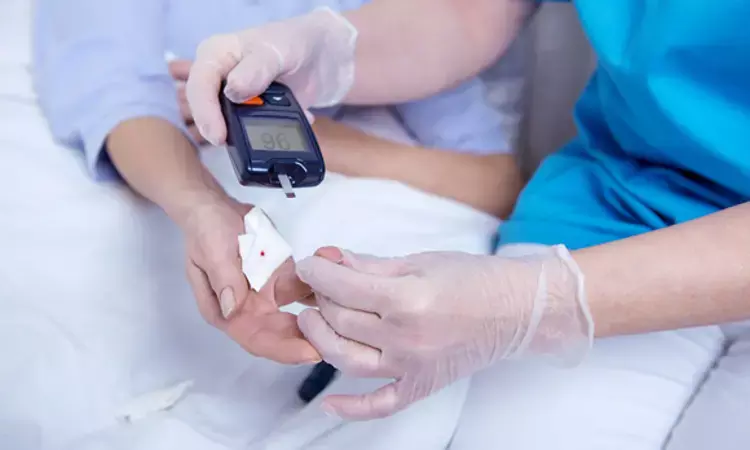- Home
- Medical news & Guidelines
- Anesthesiology
- Cardiology and CTVS
- Critical Care
- Dentistry
- Dermatology
- Diabetes and Endocrinology
- ENT
- Gastroenterology
- Medicine
- Nephrology
- Neurology
- Obstretics-Gynaecology
- Oncology
- Ophthalmology
- Orthopaedics
- Pediatrics-Neonatology
- Psychiatry
- Pulmonology
- Radiology
- Surgery
- Urology
- Laboratory Medicine
- Diet
- Nursing
- Paramedical
- Physiotherapy
- Health news
- Fact Check
- Bone Health Fact Check
- Brain Health Fact Check
- Cancer Related Fact Check
- Child Care Fact Check
- Dental and oral health fact check
- Diabetes and metabolic health fact check
- Diet and Nutrition Fact Check
- Eye and ENT Care Fact Check
- Fitness fact check
- Gut health fact check
- Heart health fact check
- Kidney health fact check
- Medical education fact check
- Men's health fact check
- Respiratory fact check
- Skin and hair care fact check
- Vaccine and Immunization fact check
- Women's health fact check
- AYUSH
- State News
- Andaman and Nicobar Islands
- Andhra Pradesh
- Arunachal Pradesh
- Assam
- Bihar
- Chandigarh
- Chattisgarh
- Dadra and Nagar Haveli
- Daman and Diu
- Delhi
- Goa
- Gujarat
- Haryana
- Himachal Pradesh
- Jammu & Kashmir
- Jharkhand
- Karnataka
- Kerala
- Ladakh
- Lakshadweep
- Madhya Pradesh
- Maharashtra
- Manipur
- Meghalaya
- Mizoram
- Nagaland
- Odisha
- Puducherry
- Punjab
- Rajasthan
- Sikkim
- Tamil Nadu
- Telangana
- Tripura
- Uttar Pradesh
- Uttrakhand
- West Bengal
- Medical Education
- Industry
DPP-4 inhibitors tied to low hypoglycemia risk in Inpatient diabetes patients: Study

Inpatient blood sugar control is usually poor and insulin therapy is not always prescribed. Reluctance to initiate insulin is due to the labor intensity of the treatment, which involves several insulin injections daily, frequent blood sugar monitoring, and fear of hypoglycemia. However, a study published in the Endocrine Practice on July 2020 suggests that Dipeptidyl peptidase-4 inhibitor (DPP-4i) treatment alone or combined with basal insulin is effective and results in lower hypoglycemia incidence compared with basal-bolus insulin regimens in general medicine and surgery in patients with type 2 diabetes.
Hospital use of oral antidiabetic agents (OADs) has not been recommended in clinical guidelines due to limited safety and efficacy data from randomized controlled trials. However, 4 recent randomized controlled trials on Sitagliptin, linagliptin and saxagliptin have reported on the safety and efficacy of dipeptidyl peptidase-4 inhibitors (DPP-4i) in general medicine and surgical patients with T2D. Dr Cristina Lorenzo-González and colleagues conducted a posthoc analysis of pooled data from the above 3 randomized multi-center clinical trials ( NCT01378117, NCT01845831, NCT02004366), to assess the efficacy and safety of treatment with DPP-4i or the combination of DPP-4i plus basal insulin compared to basal-bolus insulin regimen (standard of care) in general medicine and surgery patients with T2D.
Researchers combined the data from 3 randomized studies comparing DPP-4i alone or in combination with basal insulin or a basal-bolus insulin regimen. They included, Medicine (n = 266) and surgery (n = 319) patients admitted with blood glucose (BG) between 140 and 400 mg/dL, treated with diet, oral agents, or low-dose insulin therapy. They analyzed the patients who received DPP-4i alone (n = 144), DPP-4i plus basal insulin (n = 158) or basal-bolus regimen (n = 283). The major outcome assessed was the differences in mean daily BG between groups. They also assessed differences in hypoglycemia and hospital complications.
Key findings of the study were:
• Upon multivariate model adjusted for HbA1c, age, sex, and BMI, researchers found no difference in the percentage of BG readings within the target of 70 to 180 mg/dL (63 ± 32%, 60 ± 31%, and 64 ± 28% respectively).
• They also found no differences in mean hospital daily BG among patients treated with DPP-4i alone (170 ± 37 mg/dL), DPP-4i plus basal (172 ± 42 mg/dL), or basal-bolus (172 ± 43 mg/dL).
• They also noted no differences in length of stay or complications.
• However, they found that the hypoglycemia was less common with DPP-4i alone (2%) compared to DPP-4i plus basal (9%) and basal-bolus (10%).
The authors concluded, "Treatment with DPP-4i alone or in combination with basal insulin is effective and results in a lower incidence of hypoglycemia compared to a basal-bolus insulin regimen in general medicine and surgery patients with T2D".
For further information:
https://www.endocrinepractice.org/article/S1530-891X(20)36014-6/fulltext#%20
Medical Dialogues Bureau consists of a team of passionate medical/scientific writers, led by doctors and healthcare researchers. Our team efforts to bring you updated and timely news about the important happenings of the medical and healthcare sector. Our editorial team can be reached at editorial@medicaldialogues.in.
Dr Kamal Kant Kohli-MBBS, DTCD- a chest specialist with more than 30 years of practice and a flair for writing clinical articles, Dr Kamal Kant Kohli joined Medical Dialogues as a Chief Editor of Medical News. Besides writing articles, as an editor, he proofreads and verifies all the medical content published on Medical Dialogues including those coming from journals, studies,medical conferences,guidelines etc. Email: drkohli@medicaldialogues.in. Contact no. 011-43720751


